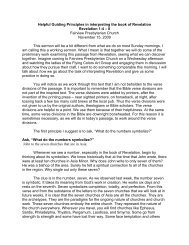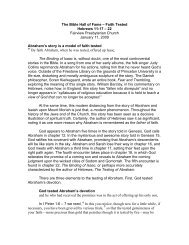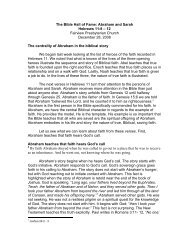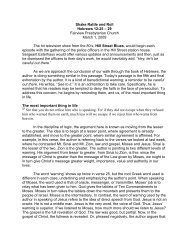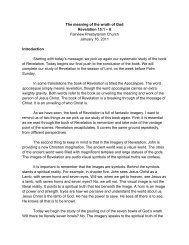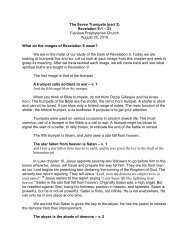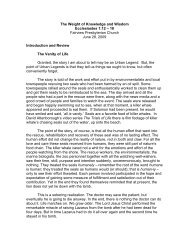To boldly go where no man has gone before Hebrews 4:14 – 16 ...
To boldly go where no man has gone before Hebrews 4:14 – 16 ...
To boldly go where no man has gone before Hebrews 4:14 – 16 ...
You also want an ePaper? Increase the reach of your titles
YUMPU automatically turns print PDFs into web optimized ePapers that Google loves.
One reason <strong>–</strong> Jesus Christ is our great high priest<br />
<strong>14</strong> Since then we have a great high priest<br />
We are told that Jesus Christ is our great high priest. He is the reason why<br />
we seek to persevere in our walk of faith. In his office as high priest, he gives to<br />
us <strong>man</strong>y blessings. Our k<strong>no</strong>wledge of his greatness encourages us to carry on in<br />
spite of the difficulties we may face in life. The author of <strong>Hebrews</strong> suggests three<br />
facets to the greatness of Jesus Christ’s role as high priest. The first is that, as<br />
our high priest, he is qualified.<br />
Jesus Christ, our high priest, is qualified<br />
who <strong>has</strong> passed through the heavens, Jesus, the Son of God,<br />
The phrase used by the author in this verse, who <strong>has</strong> passed through the<br />
heavens, is very significant. It <strong>has</strong> multiple levels of meaning. On the one hand, it<br />
means just what it says, that Jesus Christ <strong>has</strong> passed through the heavens to<br />
take his seat at the right hand of God. We celebrate this event on Ascension<br />
Day, forty days after Easter, when Christ ascended into heaven. The ancient<br />
world had three meanings for the word heaven. The first heaven is the place<br />
<strong>where</strong> birds fly, what we think of as the sky. The second heaven is the place<br />
<strong>where</strong> the stars are, what we think of as space. The third heaven is the place<br />
<strong>where</strong> God’s presence dwells in a special way, what we typically mean when we<br />
use the word heaven. Therefore, at its simplest, the author means that Jesus<br />
Christ <strong>has</strong> ascended to God’s presence.<br />
However, things do <strong>no</strong>t stop there. There is a<strong>no</strong>ther sense behind the idea<br />
of passing through <strong>–</strong> and this <strong>has</strong> to do with the order of being. In our world, we<br />
understand that there is a distinction, an increase in the nature of being, from<br />
inanimate objects, on to plant life, to animal life and finally hu<strong>man</strong> life. However,<br />
the order of being does <strong>no</strong>t stop with the seen world. The Bible does <strong>no</strong>t tell us a<br />
great deal about the unseen world, but it does speak of angels, archangels,<br />
cherubim, and seraphim. When the author of <strong>Hebrews</strong> speaks of passing<br />
through, he means that Jesus Christ <strong>has</strong> passed<br />
Through all ranks of creatures,<br />
<strong>To</strong> the central height,<br />
<strong>To</strong> the throne of Godhead<br />
<strong>To</strong> the Father’s breast 1<br />
Jesus Christ <strong>has</strong> <strong>no</strong>t simply ascended into heaven, but he <strong>has</strong> also ascended to<br />
the highest rank of name, power and authority in all of existence. He is<br />
transcended, seated at God’s right hand, and heaven itself can<strong>no</strong>t hold him.<br />
1 From the hymn, At the Name of Jesus, v. 3.



